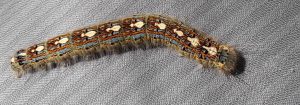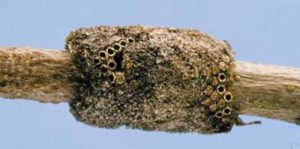A number of landowners in our region have been noticing a number of caterpillars coming down from the treetops. Sometimes appearing in vast numbers, the forest tent caterpillar has been found throughout Florida and the United States. Several years of heavy infestation occurred in Central Florida more than a decade ago, but populations are usually not high enough to cause significant damage to trees.
The forest tent caterpillar is the larval stage of a somewhat nondescript brown moth. The moths lay their egg masses on twigs, and the eggs hatch in the spring. Caterpillars feed on a variety of tree species, but seem to prefer oak and gum trees. They spend anywhere from two to six weeks eating. When they are nearing maturity, they can become a problem for humans who do not appreciate the many droppings they produce, or their habit of descending from the trees to find places to spin their cocoons. They are sometimes attracted to lights or the walls of buildings, where they congregate in search of a place to pupate. They are not harmful to people, however.
Particularly cold winters may help decrease populations of these caterpillars. Inclement weather or high temperatures may do the same in the summer, and natural predators often help to control populations when present as well. Controlling forest tent caterpillars is most often unnecessary even when there are large numbers of them. It may help to avoid parking cars under large infestations or to turn off outdoor lighting that might attract them at night. If they wander indoors, check screens and window seals to be sure there are no gaps for them to enter.
If these or other caterpillars become such a nuisance that control measures must be considered, consider using a product such as Bacillus thuringiensis, or Bt, which specifically affects caterpillars and not other beneficial insects. Keep affected trees healthy with proper fertilization and watering, and even a defoliated tree will probably recover from any damage these insects cause. For more information, see our EDIS publication on the Forest Tent Caterpillar or contact your local Extension office.
-Evan Anderson, Walton County Horticulture Agent.
- Quercus Geminata, the Sand Live Oak - November 20, 2025
- Snakes of the Panhandle - October 10, 2025
- Ganoderma, a Deadly Disease of Palms - September 4, 2025


